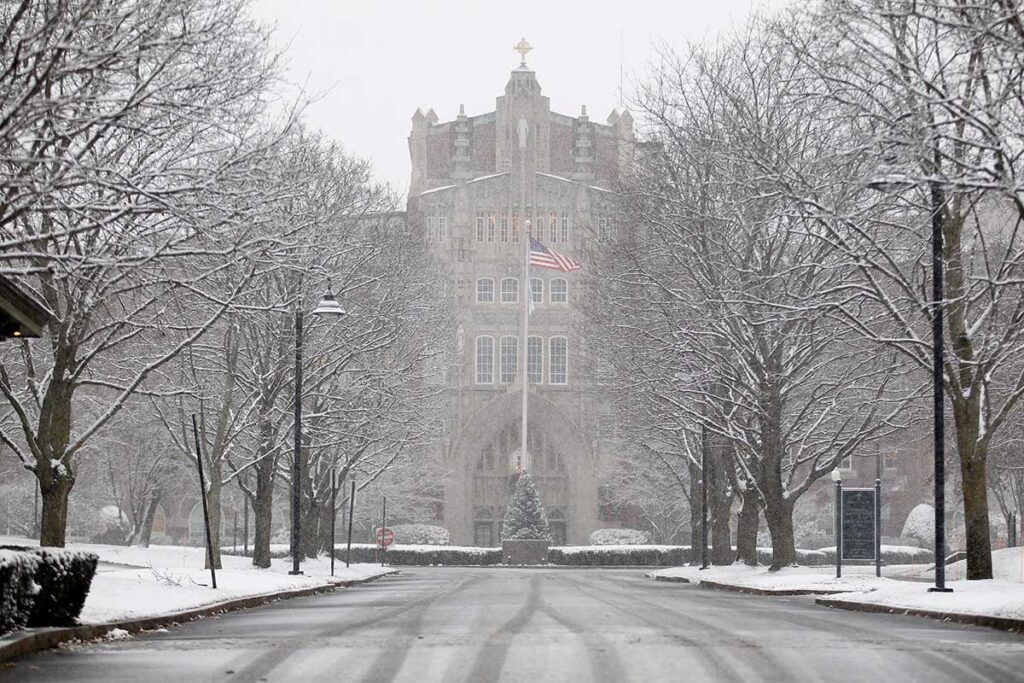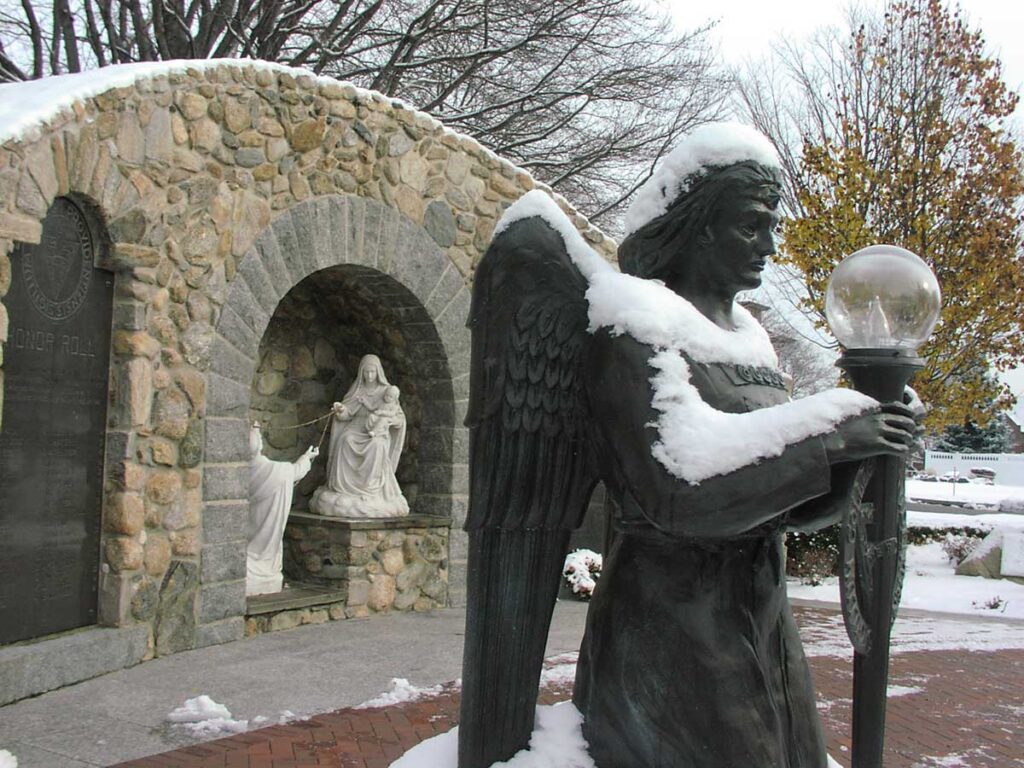Winter’s grace

This essay was originally published in the Winter 2011 issue of Providence College Magazine.
By Rev. Joseph J. Guido, O.P.
It’s the day after Christmas and a Nor’easter bears down, a wind-driven slurry of snow and sleet. The Grotto angels are caped in white while a single crow stands atop the cross above Harkins Hall. Most creatures are burrowed and huddled against the storm. Those that do venture out make a quick business of necessity. There is little inclination to tarry when winter imposes its will.
Yet despite its fury, the storm is a reminder that winter has its graces. Time is one of them, for the day is unhurried, and silence is another, as the snow dampens the sounds of the city. Then there is solitude. The break from life’s ordinary rounds invites us to stand apart, to see and hear things anew, and perhaps to divine them at a deeper level. As the poet Wallace Stevens wrote in The Snow Man, “One must have a mind of winter” to behold the “Nothing that is not there and the nothing that is.”
Winter of a kind comes to us all. It has many guises, but its most common appearance is as old age. Slowed by age and infirmity, and often politely ignored by those immersed in the busyness of life, the old have time and silence to spare. For some, it is too much. They fill their days with noisy distractions from the loneliness they fear.
But for those who are able and willing, solitude can be wrung out of long, quiet days. When it is, the old develop “a mind of winter” and see deeply what most see only superficially. They may even see what Gerard Manley Hopkins called the “inscape,” the distinctive nature of things, and so have the privilege of seeing as God sees and of seeing God in all things.
A number of Dominicans in the Priory have entered their winter years. Most have done so with uncommon grace. Largely unknown to the present generation of students and faculty, they now bear a different and, in many ways, deeper witness than they did in their youth. Once it was the eloquence of their words or the force of their personalities that defined them; now it is the gentleness of their mien. Some once traveled far and wide, befriending the famous or serving the poor in mission lands. Now they are quietly generous to those close at hand. They write a note to someone bereaved, offer an encouraging word to a young friar wearied by the cares of the day, or pay a visit to an alumnus who is old and ill, or one young and lonely.
Yet they bear their most important witness by their prayer. There is the Mass and Office, to be sure; but it is their private prayer that impresses most. It is something they rarely speak about and nearly always deliberately do quietly and out of public view. But here and there, and on the off chance, one catches glimpses of it. The rosary threaded through fingers on a walk down a familiar path or across a parking lot. The quick visits to the Blessed Sacrament, the well-thumbed pages of a prayer book, or the rubber-banded collection of holy cards. Often it is unexpected: in the chapel early in the morning, head bent, or late in the day in the chapel balcony, eyes fixed on the tabernacle. Coming upon them at such times one feels like an intruder who would do best to leave quietly. That, or learn from them and do the same.
Doing so is not easy. Sister Ruth Burrows, a Carmelite nun, makes a point of saying that prayer is a very simple thing to do but because it is, it is also a very hard thing to do. Hard because we are used to being busy, to seizing the initiative and doing what must be done: good things, worthy things, certainly necessary things. But the simplicity of prayer requires us to do just the opposite: To let God have the initiative, to wait on his will and grace, and so let him do what he wants to do with us. Prayer therefore is less something one does than a response to what God does; less a matter of technique than an inclination, a disposition or tending of one’s being in the direction of God. For us, the readiness is all; anything else is God’s to give and do.
That is why we often fail to pray, despite our best intentions, or grow frustrated when we do: so little useful seems to get accomplished. The mind wanders, we grow sluggish and sleepy, and nothing seems to happen: no revelation or insight; no sense that we are doing it right or are pleasing to God; and no apparent changes in ourselves or in the circumstances of our lives. Truth be told, it can seem a waste of time. Better to do something useful, we think.

Perhaps that is why prayer is a particular grace of winter. For on a snowy day or in the latter years of our lives, there is time to waste on prayer: little else to be busy about, and little to be accomplished. There is time for waiting and time for silence, time enough to grow familiar with solitude, and so time to listen; time even to be less than useful, as the world accounts utility. And in those long winter hours, grace upon grace: eyes seeing anew, and more deeply; beholding him.
If this is true of the winters imposed upon us, is it not also true of those we elect? To set time alone each day to wait on God in quiet, unhurried with rosary, or bible or clear view of field and ocean, may well seem like a waste of time. It certainly will not accomplish much. The mind may wander and we may grow listless; no matter, that. For it is not a matter of what we do but of what he does. And in his time and way, he will always grant us a “mind of winter” with which to see, if only dimly, what we had not seen before or else not seen clearly: “inscape,” things as they are, God in all things.
We may feel like intruders now, stumbling on our elders in prayer. But if we learn from their witness we can do what they do, and long before winter imposes its will. For no doubt it would be their fondest hope that we would learn early what they perhaps learned only later: the time wasted on prayer is the most important time of all.
Father Guido, former vice president of mission and ministry, is an assistant professor of psychology and a counseling psychologist in the Personal Counseling Center.





